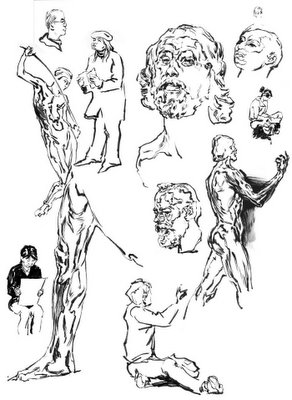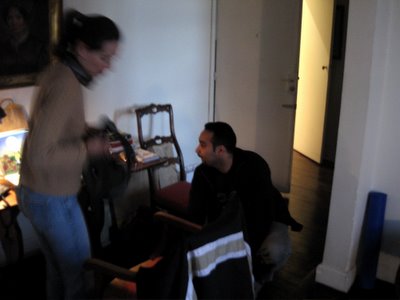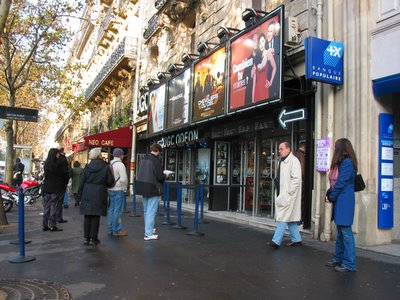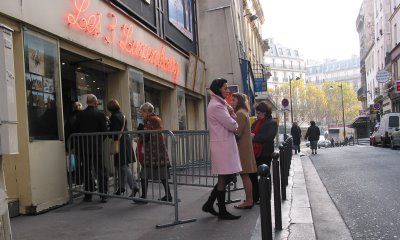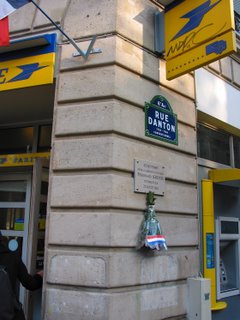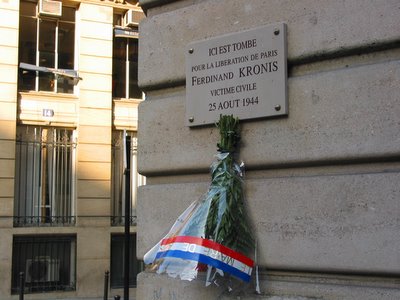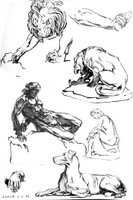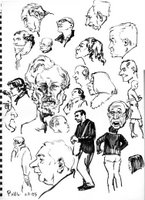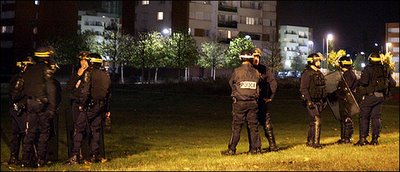I have what some might uncharitably call a very limited French vocabulary: I know the
merci, oui, and
bonjour, that we all come equipped with from birth. To this I have worked to add the three "au's:"
au revoir, ("until I see you again," or just, "later"),
aujourd'hui (today), and
aubergine (eggplant). I know that "I" am
Je, I know that "you" are
tu; but you can also be
vous, and we can be
nous. To these noun subjects I can append the verb "to be" (
je suis, nous sommes—not sure of the others...) or the verb "to have" (particularly useful in the formal "you" form of address for the question,
"Vous avez...?" {"[Do} You have...?"}: ie.,
"Vous avez le moelleaux?" {"Do you have cake?"}).
This already seems like a lot of French, I know. But ever insatiable, I've been pushing beyond these boundaries. I learned very quickly how to mispronounce
pardon, which looks like pardon in English, but is pronounced here with such effective insouciance that I am left flailing to properly mimic the method of the natives (something about stressing the vowels, not the consonants). For myself, as a person accustomed to addressing strangers with the smallest words of social kindness for the sake of politeness and our common humanity (“Excuse me,” “Oh, pardon me,” “After you,” that sort of thing), it was imperative to learn some word that would help me negotiate those moments of crowding onto sidewalks or into cafés, shops, museums and the Metro with strangers for whom French was their first language.
“Excusez-moi” is a little too emphatic, and
“pardon” is by far the preferred expression here. So I try. It helps grease the innumerable instances of close contact.
Also in this vein is the word
problèm, again teasingly identical to its English spelling (do you detect a theme?). My pronunciation is a little better with this one; I can say “proh-
blehm.” But nothing is ever a problem over here (except those things involving banks, Wi-Fi or the Internet), so I use this word in the more complicated construction,
“Pas problèm,” or “No problem,” as I’ve come to understand its meaning. In an attempt to imitate the locals, I have adopted this as a way to say just this, “no problem;” a very useful thing in restaurants or anywhere you wish to lessen the pressure on a service person, or wish to show understanding of a sort: “The soup is coming,” they say, or, “The earliest we can have it for you is Wednesday.”
“Pas problèm,” I say. And I smile.
I think this
“pas problèm,” is a sort of contraction of “It’s no problem,” or
“Ce n’est pas de problèm,” which I have just had spelled out for me by Dear Wife, who also explained to me that the French people are in fact saying “Pas
de problèm,” not “Pas problèm,” and that they are just muffling (or “eliding,” as she puts it) the “de” part. “Pas de problèm?” So I have been saying this incorrectly.
See, I am constantly learning!
Rounding out this arsenal of weighty French is the verb
oublier, which means "to forget," as in
"j'oublie" (I forget). I picked this up somewhere soon after we arrived, and have been working ever since to hone my usage; never mind that I am forced to look up in Dear Wife's dictionary the proper spelling for this verb in the infinitive (I just want to be sure), and then had to ask her how to correctly conjugate it for
je. I have become confident enough to throw it around in public, in particular with sales people whom I wish to let down gently about some article I may have tried on and do not wish to buy today ("aujourd'hui"), but may buy in the future, after I have thought about it, (
"Je pense," {"I think"}, I tell them incorrectly, looking thoughtful--I don't know how to tell them I will think about it). But to this mild assurance I've become fond of adding the more emphatic, "I won't forget." Then I smile again, and they smile, and I walk out of the shop, very contented in my obvious internationalism.
Could it possibly remain thus?
This morning Dear Wife and I finally managed a proper sit down meal at The Frog and Princess Pub, taking advantage of their Sunday Brunch (which disappointingly didn't offer Dear Wife's longed-for fried shrimp won-tons). I feel a little uncomfortable in this place, mainly because I see it as a twin of the despised Moose, a drink-'em-up watering hole catering to junior-year-abroad English-speaking students, and doubtless imposing the same nightly mayhem on the residents of its own quiet street. Also, I am not very charmed by their English-speaking waitresses, (who are nice enough), or their English menu (amazingly like a slightly down-scale Karl Strauss, or any other micro-brewery restaurant back in the States, with the dining room encircled by shiny beer tanks, each labeled with some self-consciously "branded" name for the brew it's stewing, like "King Frog Lager," or "Dark Froggy Night Ale," with attendant silly illustration) (I just made those names up without much thought, and I’m certainly as uninformed as any non-beer drinker [I only imbibe with the All Blacks], but I just looked up The Frog and Princess Pub on the web and found these “labels” from their actual stable of brews—uncanny).
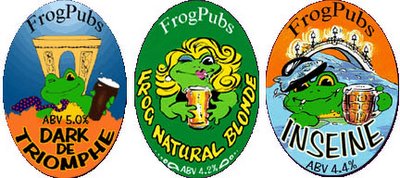
The “F & P” was practically empty at noon-plus-ten-minutes on this non-raining Sunday morning (dry enough to go out in my new boots, and Dear Wife in her new jacket!), so we were shown to a table and began examining the brunch fare. I got the 18 Euro “American Breakfast” (it was too big, but was the most economical considering it came with a choice of orange juice or “jus de pamplemousse”—grapefruit juice—which Dear Wife ordered and I thought was even better than my orange juice; also a choice of coffee or tea—and free refills on the coffee! unheard of over here—and a big spread of two eggs, lots of bacon, two hefty sausages, a steamed tomato with herbs, a basket of toast and jam, and a pile of pan-fried mashed potato balls; as if this weren’t enough, also included as a second course—most unlike America, and the only give-away that we were in fact being served in Paris—were two large pancakes, competently prepared, accompanied by a petite pitcher of warm maple syrup); Dear Wife ordered the slightly smaller English Breakfast (much the same as mine, but with baked beans[?]).
As we enjoyed this meal (no smokers nearby for the majority of it), we talked about the fun of yesterday, our second big shopping day—which was really just a continuation of the our first big shopping day, because we'd returned to Bally principally to pick up Dear Wife’s previous purchases after their alterations, and only secondarily to make decisions about a couple of shoes we’d tried on a week ago. Dear Wife and I talked of all this at breakfast, both of us still feeling a little wobbly in the knees after spending what was for us an outrageous sum. Rising this morning after the sort of deep sleep that often follows transformative passages in one’s life, each of us had been quick to inspect our purchases of the previous evening, putting them on and walking around the new apartment in them, looking at ourselves in the mirrors and looking at each other, happy but also unsure if we had become completely superficial fashion sods who had been manipulated by a perfect storm of lovely, quality merchandise, an exceptionally warm sales staff, and a recent home sale that far exceeded our expectations—a sort of buyer’s non-remorse, both of us trembling and timid in our extravagance. Did we dare venture out in our new treasures? Were they in fact too ostentatious? Would we look out of place in them?
Were we worthy?
At the time of the first big shopping day, I had employed my genteel method of letting the sales staff down easily, of forestalling any hasty decision on our part: I told them we’d think about it, (“Nous pensons?”), but that we wouldn’t forget, (“N’obliais pas,” I imagined I was saying: “I won’t forget”). When we returned last night, to be greeted warmly by the staff, and we quickly began to resume shopping, revisiting items we’d tried last week and had been thinking about, I tried to signal that we hadn’t forgotten, that I’d been true to my promise: “N’oubliais pas!” I told the manager upon his greeting. “N’oubliais pas,” I told our wondeful sales girl (uh, "sales associate") Sandrine as we began rummaging through the shoes we’d been considering since last week. We didn’t forget!
As Dear Wife and I sat at the F & P, eating brunch and recalling all this, she paused here to correct me, “You were saying, ‘N'oubliez pas.’”
“Right, ‘N’obliais pas,’ ” I said. “ ‘I won’t forget.’ I say that so they know we’re still looking—I sort of let ‘em down easy, see, or in this case I let ‘em know I didn’t forget…”
“Yeah, but you’re saying,
‘Don’t forget,’ not,
‘I won’t forget’—you’re telling Sandrine,
‘Don’t forget!’ You’re saying
‘N’oubliez pas,’ as in
‘Vous n’oubliez pas,’ ‘Don’t you forget’—it would be
‘Je n’oublie pas’ for ‘I won’t forget.’ That’s why she was pointing to her head each time you said this—she kept answering you in French, ‘I will remember’—that’s why she began counting things off on her fingers, ‘I have to remember the boots, the deer skin shoes, the loafers, the pants’—you were telling her not to forget!”
As Dear Wife explained to me this unbelievable blunder, (well, quite believable, really), I felt my entire head begin to glow hot in a scarlet blush of shame.
“You—you mean, I was demanding she
shouldn’t forget…?”
I was mortified. How could I be so blithely insulting? I could only stammer an apology, (heard by Dear Wife but directed to Sandrine and the rest of mankind), and promised to correct this as soon as possible, as soon as we returned to Bally.
For at least a month now, I have been ordering every salesperson from St. Sulpice to the Champs Elysées
“Don’t forget!”Je n’oublie pas.
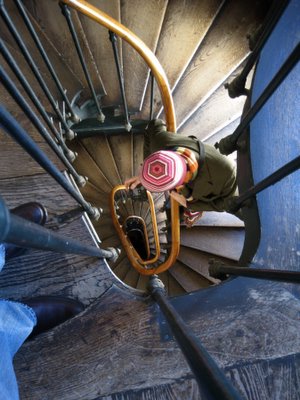 And then there are the stairs. When first we took up residence in the Bonapartment, I made sure to conspicuously hustle up our five flights at every opportunity: nothing but vanity, that. Well, my springy step ain't nowhere to be found now, under the oppression of my malady. Tonight, coming home from the American Hospital, I began our slow ascent moving like an eighty-year-old stooped and shuffling with fibromyalgia. A couple floors up, me panting, Dear Wife trying to assist, we heard someone begin bounding up the stairs from below. The quick cadence was so like the music I used to make. I tried to speed up. The stepping kept getting closer, and soon I was winded and unable to protect my lead. Finally he was right on our tail, his vigorous stomp announcing him with an unconcerned heartiness. The stairs are too narrow for anyone to pass without consent. Dear Wife had already skittered on ahead, perserving her own position. We were near the top, the merry stomper and I, and I was working hard to keep pride intact. But I was too weak. Never had I heard anyone attack the stairs with the same sort of gusto I used to flaunt--and now, I was undone by it. I couldn't keep up, and his insistent foot-falls were demanding I move over. So I did.
And then there are the stairs. When first we took up residence in the Bonapartment, I made sure to conspicuously hustle up our five flights at every opportunity: nothing but vanity, that. Well, my springy step ain't nowhere to be found now, under the oppression of my malady. Tonight, coming home from the American Hospital, I began our slow ascent moving like an eighty-year-old stooped and shuffling with fibromyalgia. A couple floors up, me panting, Dear Wife trying to assist, we heard someone begin bounding up the stairs from below. The quick cadence was so like the music I used to make. I tried to speed up. The stepping kept getting closer, and soon I was winded and unable to protect my lead. Finally he was right on our tail, his vigorous stomp announcing him with an unconcerned heartiness. The stairs are too narrow for anyone to pass without consent. Dear Wife had already skittered on ahead, perserving her own position. We were near the top, the merry stomper and I, and I was working hard to keep pride intact. But I was too weak. Never had I heard anyone attack the stairs with the same sort of gusto I used to flaunt--and now, I was undone by it. I couldn't keep up, and his insistent foot-falls were demanding I move over. So I did.







